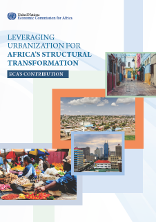Leveraging Urbanization for Africa’s Structural Transformation

Africa’s structural transformation is the overarching policy priority for the continent’s inclusive and sustainable development. As clearly expressed in the African Union’s Agenda 2063, there is now consensus among African leaders and stakeholders that structural transformation is a necessary condition to translate the region’s recent impressive growth rates into inclusive and sustainable development. Structural transformation of the African economies through industrialization is now considered imperative. By moving up within and across sectors, African countries can raise real incomes, generate decent jobs and the fiscal space to boost social development investments. Historically, urbanization has had a close association with structural transformation. Evidence around the world suggests that linking economic and urban development generates positive interactions and spill overs that improve productivity and well-being. In particular, agglomeration effects and related productivity gains resulting from well-planned urbanization are critical for achieving structural transformation in Africa. As latecomers, African countries have one unique factor over others: they can learn from previous mistakes, optimize the urban advantage and rectify distortions proactively. However, the advantages created by cities do not materialize without active public policies. Conversely, ignoring the spatial implications of economic trends heightens the risk of producing imbalanced, exclusionary and destabilizing effects.